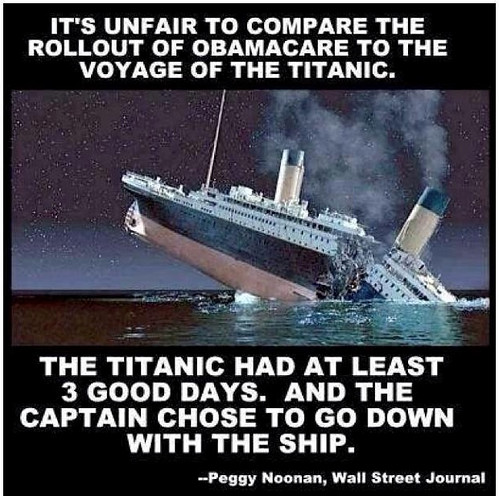| Topic: The Scariest Study on Obamacare Yet | |
|---|---|
|
Choice is a luxury Affordable Care Act customers might be lacking in 2017 When enacted in January 2014, the Affordable Care Act was expected to turn the healthcare industry on its head. And in some ways, it certainly has. As of March 31, there were 11.1 million paying ACA customers. Mind you, this figure doesn't take into account the millions of individuals and families who have benefited from the expansion of Medicaid in 31 out of 50 possible states. According to the Centers for Disease Control and Prevention, the uninsured rate hit an all-time low of just 9.1% at the end of 2015. What the data would suggest is that the ACA (or Obamacare, as it's more commonly known) has greatly improved medical access for a large swath of the population -- namely, people with low incomes and pre-existing conditions -- who previously had little chance of obtaining health insurance. Obamacare fails to live up to its billing Obamacare has its shortcomings, though. Its expansive requirements for minimum essential benefits were designed to protect the consumer, but they actually wound up causing millions of consumers to lose their pre-Obamacare healthcare plans. This more comprehensive coverage also lifted premium prices. Meanwhile many insurers, no longer allowed to pick and choose their customers, have been hit by adverse selection. In plainer terms, sicker people who had been shut out of the healthcare system before Obamacare can now buy health insurance, which is leaving insurers with higher medical expenses than expected. For example, UnitedHealth Group (NYSE:UNH), the largest insurer in the country, is on track to lose $500 million this year from its Obamacare plans. But the biggest concern of all has been premium inflation. It was believed that Obamacare's transparent online marketplace would allow the consumer to make smart purchasing decisions. Furthermore, the risk corridor -- a type of risk-pooling fund that collected money from overly profitable insurers and disbursed those funds to insurers who lost excessive amounts of money by pricing their premiums too low -- was expected to promote competition and help control premium inflation. Neither has had much effect, as consumers are not taking full advantage of the information that's available (many people are re-enrolling every year without comparing plans), and the risk corridor has failed to protect money-losing insurers. But the above concerns could be peanuts compared to the latest study released by Avalere Health, a Washington, D.C.-based consulting firm. According to Avalere's analysis of exchange market regions across the country for the 2017 plan year, nearly 36% of consumers are expected to have just one participating insurer offering coverage. Seven states -- Alaska, Alabama, Kansas, North Carolina, South Carolina, Oklahoma, and Wyoming -- are expected to have just a single insurer offering Obamacare coverage in 2017. It's worth pointing out that a single insurer may offer multiple plans, even within a single ACA tier (bronze, silver, gold, and platinum). However, the only plan comparisons that can presumably be made are with the same insurer. Furthermore, another 19% of consumers are believed to have a choice between just two insurers. The remaining 45% of consumers are forecast to have three or more competing insurers to choose from. In a small number of regions, Avalere says there may be no Obamacare plans offered at all. How does this compare with 2016? Based on Avalere's research, just 4% of market region consumers had only one insurer to choose from, 29% had two insurers to compare, and 67% had three or more insurers competing. So, over the course of a year, the number of consumers with just a single insurer to choose from will rise 800%. At the heart of the problem for Obamacare is that insurers are leaving the program en masse. Part of it has to do with the failure of the risk corridor to adequately protect money-losing insurers, while the dynamics of Obamacare are driving other insurers to the sidelines. For instance, of the 23 healthcare cooperatives approved by Obamacare, 16 have announced that they're closing their doors this year. Healthcare cooperatives are low-cost, consumer-focused options, but practically all co-ops have been losing money. The risk corridor was expected to protect insurers that priced their premiums too low, but a mere $362 million of the $2.87 billion requested was paid out. There are too few overly profitable insurers, so the risk corridor simply didn't get enough funding, dooming more than two-thirds of the low-cost co-ops to failure -- and more co-op closures could be on the way. Adverse selection appears to be the primary culprit that prompted UnitedHealth, Humana (NYSE:HUM), and Aetna (NYSE:AET) to significantly reduce their Obamacare offerings in the upcoming year. Within the past few months, UnitedHealth Group has announced that it will reduce the number of states in which it offers ACA plans during 2017 to just three from 34 in 2016. UnitedHealth's expected $500 million loss in 2016 from its ACA plans, following a more than $400 million loss from its ACA plans in 2015, compelled it to make the move. Aetna and Humana, which had been planning to merge, announced their respective plans to pull back on their ACA offerings after federal regulators announced their intentions to block the merger for fear it would reduce competition. The day the Justice Department announced its intentions, Humana told investors it would pull out of at least eight of its 19 current states by 2017. More telling is the fact that Humana is reducing the number of counties in which it offers coverage from 1,351 this year to 156 next year -- a nearly 90% decline. Aetna, for its part, is expected to reduce its county offerings by 69% to just 242 in 2017, and it'll be offering plans in only four states. With three of the five largest insurers scaling back their ACA offerings and competition falling, it could be extremely difficult for the Affordable Care Act to remain "affordable" in the coming years. |
|
|
|
|
|
So where does the money go? Many insurers and hospitals are "non-profit" that doesn't mean people don't make money from them, but hardly enough to cause the increases that are required to run things. A lot of the blame is to be put on drug companies. They restrict tobacco and alcohol advertising everywhere nowadays. But they have drug advertising everywhere for things that people have never heard of until they see the add. And the prices keep going up, and the number of drugs increase. Also the number of lawsuits and malpractice suits increase as the lawyers get rich off it. Then you have an increase in the number of people being diagnosed with things and requiring treatment, drugs, or surgery. They should have a lifetime cap on what they spend on people, we can only do so much. Its not just the amount of money going to Obama care that is the problem, or the lack of organization, even tough they are still handing bonuses when things don't go right. But the bigger picture is that we need total health care reform. A look into what's right, and what's wrong. Insurance rates have been going up by double digits and more for years. Sometimes its in the best interest to just let people die instead of having them suffer for a few extra years. The laws must change, and the outline of what can and can't be done in heath care need to happen. If you want a specialty drug, then pay for it out of your pocket. Having sex is a luxury, not everybody else's responsibility.
|
|
|
|
|
|
The socialist knew it wouldn't work. What they want is a single payer system.
|
|
|
|
|
|
http://nypost.com/2016/10/07/bill-clintons-obamacare-rant-was-scripted-and-approved-by-obama/
Bill Clinton’s ObamaCare rant was scripted — and approved by Obama By Edward Klein October 7, 2016 When Bill Clinton recently criticized ObamaCare as “the craziest thing in the world,” it looked to everyone like he had given Donald Trump a stick to beat Hillary with at their second presidential debate this Sunday at Washington University in St. Louis. But as usual, the Big Dog was crazy like a fox. According to multiple sources both in the White House and the Clinton campaign, Bill was following a carefully crafted script that was poll tested and endorsed by his wife and Barack Obama. “Barack warned Hillary that she was going to have to confront an attack from Trump or [the debate moderators] Anderson Cooper and Martha Raddatz on the problems with ObamaCare,” said a source with intimate knowledge of a conversation between the president and Hillary Clinton. “Barack said he was aware of the widespread unhappiness with ObamaCare’s massive premium increases,” the source continued, “and that Hillary had to be ready during the presidential town hall debate to defang the attack that was sure to come.” This source, who was in the room when Obama spoke to Hillary about the upcoming debate, reconstructed the conversation for me as follows: “The president told Hillary, ‘You and Bill have to go out there and say there’s plenty wrong with ObamaCare, but that we know how to fix it if I’m elected president. I’m not running for anything, but I want to make sure my signature achievement isn’t dismantled by Donald Trump.’ ” (Even Chelsea has gotten in on the act, saying this week that “we need to work on the ‘affordable’ part of the Affordable Care Act.”) |
|
|
|
|
|
If we had a congress that worked for America instead of themselves, they could kill Obamacare without repealing it.
|
|
|
|
|
|
Edited by
Conrad_73
on
Fri 10/28/16 07:43 AM
|
|

|
|
|
|
|
|
http://farm6.static.flickr.com/5521/10732063466_ae34aaf8e9.jpg  Fixed it for ya |
|
|
|
|
|
http://farm6.static.flickr.com/5521/10732063466_ae34aaf8e9.jpg  Fixed it for ya Thanks,just saw that I forgot the Slash!   |
|
|
|
|
|
Some things are designed to be disposable & replacable & some things are designed to just fail.
|
|
|
|
|











